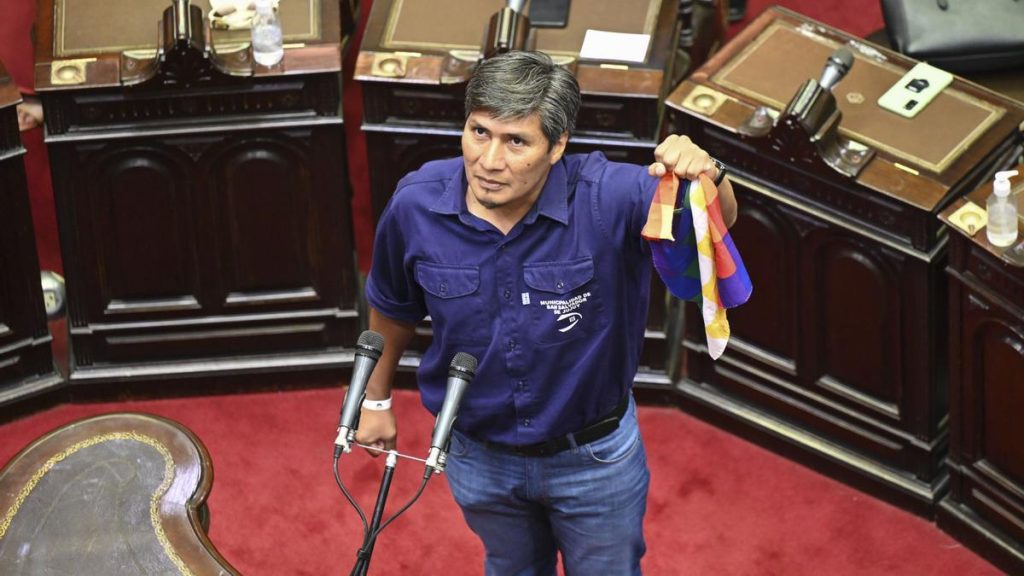In Argentina’s northernmost province of Jujuy, where 80 percent of the population is of Indigenous lineage and more than 40 percent live below the poverty line, the anticapitalist left is steadily increasing its influence. The province, along with two others, held gubernatorial elections last Sunday and Alejandro Vilca who represents the Workers’ Left Front – Unity (known as the FITU according to its Spanish initials) earned approximately 13 percent of the vote. That’s more than any left-wing candidate has earned in a governor’s race anywhere in the country in four decades. In the province’s capital city of San Salvador de Jujuy, Vilca took 18 percent, placing him second in the race and ahead of the Peronist candidate.
Unlike the candidates of the traditional parties, who are without exception career politicians, Alejandro Vilca is a long-time sanitation worker in the city of San Salvador de Jujuy. For over a decade he has collected refuse on the streets of the city’s poorest neighborhoods. In 2021, he was elected to Argentina’s Congress as a representative of the Workers’ Left Front. But once his term ends, he will return to his job on the sanitation truck. And as a person of Indigenous heritage and the son of a domestic worker, he knows firsthand the poverty and exclusion faced by most Jujueños, including its many thousands of miners, agricultural workers, factory operatives and unemployed people. As one worker put it “Vilca is one of the humble ones, those who are at the bottom, those who know what it means to work for your meals each day.”
The Workers’ Left Front is composed of four Trotskyist parties, including the Partido de los Trabajadores Socialistas (PTS, Party of Socialist Workers), the party to which Vilca belongs and the sister organization of Left Voice. Its results last Sunday are the best for any left-wing party or coalition in an Argentinian gubernatorial election in 40 years. The coalition also more than tripled its total from the last governor’s race in 2019. And while Vilca did not ultimately win his race, the Workers’ Left Front seized three new seats in the provincial legislature and several seats in local councils.
But the candidates of the Workers’ Left Front have no illusions of reforming the system from inside. For them, the seats they’ve earned in federal, state, and municipal legislatures act as loudspeakers for the struggles of exploited and oppressed people and as a platform for the transmission of revolutionary ideas. At every picket line and every street demonstration, they can be found marching shoulder to shoulder with their fellow workers, students, and militants.
It is not a coincidence that Jujuy has become a bastion for the anticapitalist left. It is a region marked by extreme inequality, where hundreds of thousands suffer poverty and hunger alongside big businesses earning staggering profits. This is particularly true in recent years with the vastly increased demand for lithium, an abundant resource in Jujuy. And the interests of these corporations are heavily defended by the traditional parties of both the center right and the Peronist center left.
Vilca and his comrades within the Workers’ Left Front presented a program radically different from that put forward by the establishment parties. Theirs is a program that addresses the needs of the working class, the Indigenous, and the poor, not those of the corporations and the elite. Among the demands they put forward are: a minimum wage equal to the cost of living and indexed to the inflation rate, the reduction of the workday to 6 hours daily without any cuts to salaries, and economic aid for the agricultural workers left jobless outside of the planting and harvesting seasons.
The socialists of the Workers’ Left Front consider that these measures are the only ones capable of combating the severe inflationary crisis and poverty that have racked Argentina. In just the past twelve months, the country’s inflation topped 100 percent, compared to less than 10 percent in the United States in the same time. As a result of the dramatic rise in the cost of living, the poverty rate has more than tripled in recent years. In testament to the irrationality of the capitalist system, this widespread poverty exists at the same time the price of lithium is at record highs. Mining revenues are expected to top $6 billion in Argentina this year.
The vote totals for the anticapitalist left are even more impressive when considering the widespread reports of irregularities at polling sites throughout the province. Election rules in Jujuy, and much of Argentina, require a separate ballot for each political party or coalition. There is no single ballot with the names of all candidates listed. However, many residents in the province reported that ballots for the Workers’ Left Front were missing from polling sites, meaning votes could not be cast for the left-wing coalition. At other sites, volunteer poll watchers were prevented from entering polling sites in order to monitor the election process, in violation of Argentinian law. Vilca’s performance, in spite of these obstacles, showed once again that working-class people can run elections and win popular support.
Jujuy’s new governor will be Carlos Sadir, who like the incumbent is a member of the Radical Civic Union (or UCR), the traditional party of Argentina’s center right. Sadir took around half of the vote in Sunday’s election, while the Peronist candidate allied with president Alberto Fernandez took just over 22 percent. The far right, which is well financed and receives regular media coverage, performed dismally in Jujuy, with just over 3 percent of the vote.
The politicians of the right and the center-left like the Peronists have shown clearly that they are not on the side of working people and govern only to ensure the profits of the biggest corporations. In order to confront the growing poverty, hunger, and ecological degradation in Argentina, a radical program is needed — a program that only the Workers’ Left Front is fighting for.











